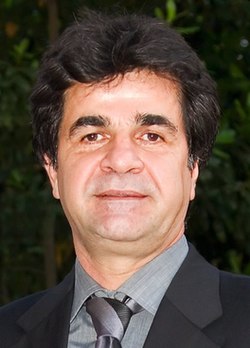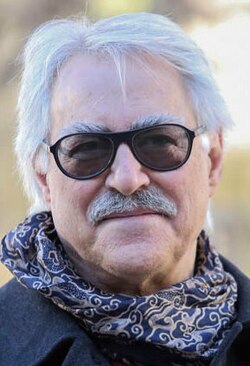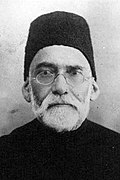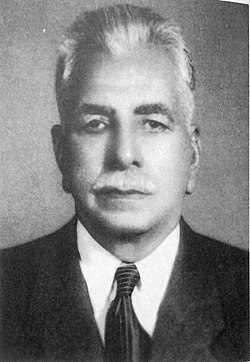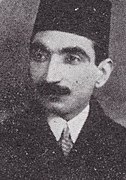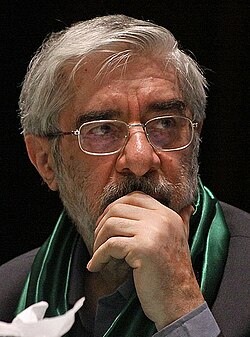- Fatma Mukhtarova
(1893–1972) - Aref
(1940) - Homeyra
(1945) - Sattar
(1949) - Googoosh
(1950) - Dariush Eghbali
(1951) - Mansour
(1971) - Arash
(1977)
Arts and entertainment
Music
Singers
- Fatma Mukhtarova – (6 March 1893 or 1898, Urmia – 19 October 1972, Baku) opera singer; Iran-born Soviet Azerbaijani, paternal Iranian Azeri, maternal Tatar. [1]
- Rubaba Muradova – (21 March 1930, Ardabil – 28 August 1983, Baku) opera and folk singer; of Iranian Azeri descent. [2]
- Aref – (10 August 1940, Tehran) pop singer and former actor; of Ardabili Azeri descent. [3] [4]
- Homeyra – (17 March 1945, Tehran) pop singer. [5]
- Sattar – (19 November 1949, Tehran) pop and classical singer; father of Iranian Azeri descent. [6]
- Googoosh – (5 May 1950, Tehran) singer and actress; parents were Soviet Azerbaijani immigrants. [7] [8]
- Mahasti – (16 November 1946, Tehran – 25 June 2007, Santa Rosa, California) pop singer; Iranian Azeri father. [9]
- Hayedeh – (10 April 1942, Tehran – 20 January 1990, San Francisco, California) pop singer; elder sister of Mahasti [9]
- Dariush Eghbali – (4 February 1951, Tehran) singer. [10]
- Hasan Anami Olya – (15 March 1967, Tabriz) opera singer; Baku-based Iranian Azeri. [11]
- Rahim Shahriari – (20 February 1971, Tabriz) singer and songwriter. [12]
- Mansour – (28 July 1971, Tehran) pop singer, actor, and fashion designer. [13]
- Arash – (23 April 1977, Tehran) singer, entertainer, and producer; Swedish Iranian of Azeri descent. [14]
- Rashid Vatandoust - (1946, Tabriz) opera singer
- Sami Yusuf – (21 July 1980, Tehran) singer, songwriter, multi-instrumentalist and composer; British Iranian born in Tehran to Soviet Azerbaijani parents [15]
- Omid Hajili – (24 September 1983, Tehran) pop singer and composer. [16]
Composers and instrumentalists
- Gholamhossein Bigjekhani – (1918, Tabriz – 13 April 1987, Tabriz) tar player. [17]
- Ali Salimi – (1922, Baku – 22 April 1997, Tabriz) composer and tar player; Bakuvian of Iranian Azeri descent. [18]
- Samin Baghtcheban – (1923, Tabriz – 19 March 2008, Istanbul) composer, author and literary translator. [19]
- Farhad Fakhreddini – (11 March 1939, Gədəbəy) composer and conductor; Iranian of Soviet Azerbaijani descent. [20] [21] [22]
- Nasrollah Nasehpour – (24 October 1940, Ardabil) composer and singer. [23]
- Mahmud Shaterian – (1944, Tabriz – 22 September 2006, Tabriz) composer and tar player. [24]
- Naser Cheshmazar – (31 December 1950, Ardabil – 4 May 2018, Tehran) composer and pianist. [25] [26]
- Hossein Alizadeh – (23 August 1951, Tehran) composer and multi-instrumental; maternal Persian, paternal Azeri from Urmia. [27] [28]
- Dariush Pirniakan – (13 April 1955, Gargar) composer and tar player. [29]
- Davood Azad – (6 October 1963, Urmia) singer, multi-instrumental musician, and composer. [30]
- Samin Baghtcheban
(1923–2008) - Farhad Fakhreddini
(1939) - Naser Cheshmazar
(1950–2018) - Hossein Alizadeh
(1951) - Dariush Pirniakan
(1955) - Davood Azad
(1963)
Visual arts
Calligraphers
- Ali Reza Abbasi (?, Tabriz –c. 1616) calligrapher. [31]
- Abd al-Baghi Tabrizi – (? – 1629, Tabriz) calligrapher. [32]
- Ala' al-Din Tabrizi – (16th-century) calligrapher and painter.
- Mohammad Hossein Tabrizi – (16th-century) calligrapher. [33]
- Ali Adjalli – (8 February 1939, Miyaneh) calligrapher, painter, poet and educator. [34]
Filmmaking
Actors
- Mustafa Mardanov – (10 March 1894, Mianeh – 28 December 1968, Baku) actor; Iran-born Soviet Azerbaijani. [35]
- Jamileh Sheykhi – (29 April 1930, Zanjan – 23 May 2001, Tehan) actress. [36] [37]
- Ebrahim Abadi – (15 August 1934, Tabriz – 31 October 2019, Tehran) stage and film actor. [38] [39]
- Reza Beyk Imanverdi – (15 June 1936, Tehran – 13 September 2003, Laveen Village, Arizona) actor and director; maternal Qazwini and paternal Bakuvian, Iranian-American. [40] [41]
- Behrouz Vossoughi – (11 March 1938, Khoy) actor. [42] [43]
- Cihangir Ghaffari – (9 September 1940, Baku) actor and film producer. [44]
- Reza Naji – (26 December 1942, Tabriz) actor. [45] [21]
- Valiollah Momeni – (31 May 1943, Ardaibl – 29 December 2015, Karaj) actor and voice actor. [46]
- Jamshid Hashempour – (23 March 1944, Tehran) actor. [47]
- Atash Taqipour – (1945, Khoy) theater, cinema and TV actor. [46]
- Mina Jafarzadeh – (4 February 1947, Khoy) actress. [48]
- Jalil Farjad – (9 March 1952, Marand) actor. [49]
- Alireza Khamseh – (29 January 1953, Tehran) comedian, cinema and television actor. [50] [51]
- Jahangir Almasi – (9 June 1955, Tehran) actor; of Zanjani Azeri descent. [52]
- Parviz Parastui – (24 June 1955, Kabudrahang) actor. [53] [54]
- Atila Pesyani – (30 March 1957, Tehran) actor; maternal Azeri, son of Jamileh Sheykhi. [55]
- Afsar Asadi – (16 January 1958, Mianeh) actress and make-up artist. [56]
- Akbar Abdi – (26 August 1960, Tehran) actor. [57] [58]
- Shirin Bina – (20 August 1964, Marand) theater, cinema and TV actress. [59]
- Farhad Ghaemian – (1965, Ardabil) theater and cinema actor. [60]
- Marjaneh Golchin – (21 February 1969, Tehran) actress; paternal Azeri, maternal Mazandarani. [61]
- Rambod Javan – (22 December 1971, Tehran) actor, director and TV peresenter. [62]
- Keyhan Maleki – (24 August 1968, Tehran) actor. [46] [63]
- Mir Taher Mazloomi – (26 February 1975, Tehran) actor and voice actor. [46]
- Amir Aghaei – (1 August 1975, Urmia) actor and author. [64]
- Hadi Hejazifar – (21 June 1976, Khoy) actor, director and screenwriter. [65]
- Hadi Kazemi – (4 November 1976, Tehran) actor. [66]
- Behnam Tashakkor – (24 January 1977, Bandar Anzali) actor. [67]
- Mohammad Reza Golzar – (21 March 1977, Tehran) actor, TV host, presenter and model. [68] [69]
- Hossein Abedini – (1980, Zanjan) actor. [70]
- Maryam Palizban – (6 October 1981, Urmia) film and stage actress. [71]
- Hesam Manzour – (9 December 1980, Tehran) actor; of Urumian descent. [72]
- Ruhollah Zamani – (15 August 2005, Nowjeh Deh, Ardabil) actor. [73]
- Mustafa Mardanov
(1894–1968) - Jamileh Sheykhi
(1930–2001) - Reza Beyk Imanverdi
(1936–2003) - Behrouz Vossoughi
(1938) - Reza Naji
(1942) - Jamshid Hashempour
(1944) - Alireza Khamseh
(1953) - Parviz Parastui
(1955) - Jahangir Almasi
(1955) - Atila Pesyani
(1955) - Afsar Asadi
(1958) - Akbar Abdi
(1960) - Shirin Bina
(1964) - Marjaneh Golchin
(1969) - Rambod Javan
(1971) - Hadi Hejazifar
(1976) - Mohammad-Reza Gulzar
(1977) - Maryam Palizban
(1981)
Directors
- Valiollah Khakdan – (1923, Baku – 9 September 1996, Tehran) art director and scenic designer. [74]
- Yadollah Samadi – (17 November 1952, Maraga – 25 September 2018, Shiraz) film director. [75] [76]
- Rasoul Mollagholipour – (1955, Tehran – 6 March 2007, Nowshahr) film director. [77] [78]
- Majid Gharizadeh – (1955, Tehran) film director. [79]
- Tahmineh Milani – (6 September 1960) film director and feminist activist; paternal Persian and maternal Azeri. [80] [21] [81]
- Kamal Tabrizi – (28 October 1959, Tehran) film director. [82]
- Jafar Panahi – (11 July 1960, Mianeh) film director, screenwriter and film editor. [83] [84]
- Ebrahim Hatamikia – (23 September 1961, Tehran) film director, screenwriter, cinematographer and actor. [85]
- Reza Mirkarimi – (27 January 1967, Tehran) screenwriter and film director. [86]
- Masoud Dehnamaki – (29 December 1969, Ahar) conservative activist, filmmaker, and former journalist; paternal Persian, maternal Azeri. [87]
- Ali Samadi Ahadi – (9 February 1972, Tabriz) filmmaker and scriptwriter; Iranian-German.
- Valiollah Khakdan
(1923–1996) - Yadollah Samadi
(1952–2018) - Rasoul Mollagholipour
(1955–2007) - Kamal Tabrizi
(1959) - Tahmineh Milani
(1960) - Ja'far Panahi
(1960) - Ebrahim Hatamikia
(1961)
Painters, photogeraphers and cartoonists
- Sadiqi Beg – (1533, Tabriz – 1610, Isfahan) painter, miniaturist, poet and writer. [88]
- Ibrahim Mirza – (April 1540 – 23 February 1577) Safavid prince, miniaturist and poet [89]
- Mihr 'Ali – (1795 – c. 1830) court painter. [90]
- Ahmad Aali – (1935, Tabriz) photographer. [91] [21]
- Mansoor Ghandriz – (2 March 1936, Tabriz – 26 February 1966) painter. [92]
- Aydin Aghdashloo – (30 October 1940, Rasht) painter, graphist and art curator; Iranian of Soviet Azerbaijani descent. [93]
- Haydar Hatemi – (3 March 1945, Gargar) painter, sculptor; Iranian-American of Azeri descent. [94]
- Reza Deghati – (26 July 1952, Tabriz) photojournalist; Iranian-French of Azeri descent. [95]
- Javad Alizadeh – (9 January 1953, Ardabil) comic artist, cartoonist, art writer and blogger. [96]
- Khosrow Hassanzadeh – (1963, Tehran) painter, installation artist and ceramist. [97]
- Aydin Aghdashloo
(1940) - Reza Deghati
(1952) - Javad Alizadeh
(1952)
Sculptors
- Ahad Hosseini – (4 August 1944, Tabriz) sculptor and painter. [98]
- Akbar Behkalam – (16 September 1944, Tabriz – 7 February 2025, Berlin) painter and sculptor; Iranian-German. [99]





































